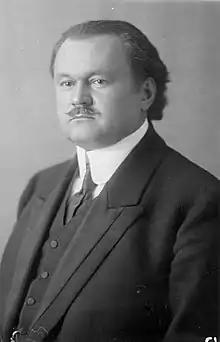Nikolai Yevgenyevich Markov
Nikolai Yevgenyevich Markov (Russian: Никола́й Евге́ньевич Ма́рков), known as Markov II or Markov the Second (Russian: Марков Второй)[1] (2 April 1866 – 25 April 1945, Wiesbaden),[2] was a Russian right wing political figure who was a leading figure in the Union of the Russian People (UPR).
Nikolai Markov | |
|---|---|
 Nikolai Markov, 1913 | |
| Born | Nikolai Yevgenyevich Markov April 2, 1866 |
| Died | April 25, 1945 (aged 79) |
| Nationality | Russian |
| Other names | Markov II |
| Occupation | Engineer |
| Known for | Politician, writer |
| Title | Leader of the Union of the Russian People |
| Term | 1910 - 1917 |
| Predecessor | Aleksandr Dubrovin |
| Successor | disbanded |
Born in Kursk, Markov came from a land-owning background but was also a trained engineer. He entered politics in 1905 when he formed a defence group for the upper middle classes called the Party of Civil Order, whilst also starting the journals Kurskaia Byl and Zemschchina.[3] He became a founder of the UPR and was noted as its most formidable leader, using his membership of the State Duma of the Russian Empire to attack both capitalism and socialism, as well as launching frequent attacks on the Jews, whom he predicted would be wiped out in a mass pogrom.[3] In 1911, during the discussions of the draft of the new Statute on Military Service he launched an attack on Jews in the military service, recommending the removal of Jews from the military.[4]
He became URP leader in 1910 following the departure of Aleksandr Dubrovin and his followers and took over editorship of the pro-Vladimir Purishkevich journal Vestnik Soyuza Russkogo Naroda.[3] He had long been associated with Purishkevich and had been a member of his "Union of Archangel Michael", a UPR dissident group.[5] He used his position as leader to argue for a restoration of absolutism and in the First World War supported a separate peace treaty between Russia and Germany, even attempting to get the Germans involved in a conspiracy to save the House of Romanov after the revolutions.[3] He was close to General Nikolai Yudenich and supported his anti-Bolshevik activity.[5]
He fled to Germany following the October Revolution and set up the émigré Russian Monarchist Union, although he became more associated with the far right of the monarchist movement when he expressed his admiration for Italian fascism.[3] He conspired to have Cyril of Coburg crowned Tsar,[3] a man whose wife, Viktoria Feodorovna, was close to far right former German Imperial Army general Erich Ludendorff.[6] Markov also played a leading role in the conspiracy that resulted in the murder of Constitutional Democratic Party politician Vladimir Dmitrievich Nabokov.[3] A devout member of the Russian Orthodox Church, he was involved in the Karlovtsy Sobor, a synod that led to the establishment of the Russian Orthodox Church Outside Russia.[5]
He published his memoirs, Voiny temnykh sil (Wars of Dark Forces), in 1928 and soon thereafter became a follower of the Nazi Party.[3] He would go on to argue that the URP had shared many characteristics with the Nazi Party, although this has been rejected given that the URP was little more than anti-Semitic populism.[7] His anti-Semitism grew more pronounced in the 1930s and he undertook lecture tours and propaganda duties for the Nazis on the subject.
References
- Because he was the younger of two Duma members named Markov.
- Марков Николай Евгеньевич (1866-1945) by Roman Romov (in Russian)
- Philip Rees, Biographical Dictionary of the Extreme Right Since 1890, p. 255
- Yohanan Petrovsky-Shtern, "The "Jewish Policy" of the Late Imperial War Ministry: The Impact of the Russian Right", in "Kritika: Explorations in Russian and Eurasian History 3.2 (2002) pp. 217-254" - "The Talmud provides us with innumerable passages that make clear how observant Jews should avoid the fulfillment of any promise or any oath. The Jews mock and jeer at oaths. Now, if a soldier does not respect an oath, violates an oath, and even considers that his religious cult approves his scorn of an oath, it is obvious that we can get nothing but evil from him... It is shocking that the War Ministry hesitates to cut this sore out of the noble pure body of the Imperial Russian Army."
- Jeanne Vronskaya & Vladimir Chuguev, The Biographical Dictionary of the Former Soviet Union - Prominent People In All Fields From 1917 to the Present, London: Bowker-Saur, ISBN 0862916216, p. 326
- Walter Laqueur, Russia and Germany: A Century of Conflict, 1990, p. 74
- H. Rogger, Jewish Policies and Right Wing Politics in Imperial Russia, 1986